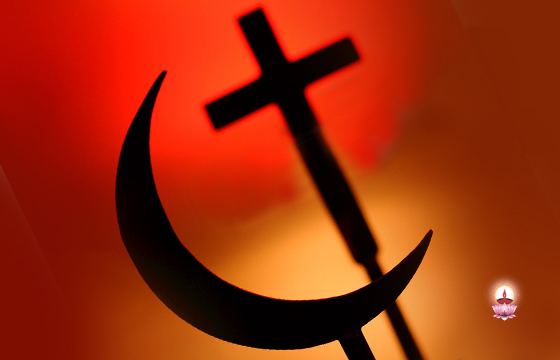Azadi ka Amrit Mahotsav Kolkata event honours four Clergymen
Pope Francis asks businesses to support working women: They’re ‘afraid to get pregnant’
Study: Christianity may lose majority, plurality status in U.S. by 2070
Indian politician declines Magsaysay Award under party pressure
Like John Paul II, Pope Francis heads to Kazakhstan during time of war

In Kerala, Islamophobia among Christian community has increased in the recent years. Unprecedented animosity is slowly boiling between the two communities that were living in amity for several centuries. Several social and religious issues have developed between the communities in the recent past like chopping off the hand of P.J. Joseph, a college professor, by the Islamic extremists; preaching by some Salafi scholars against the Biblical revelations; and the marrying of Christian girls by Muslim boys with pretended love (popularly known as love Jihad) to mention a few.
However, the present rift is not merely reduced to religious differences, but stretches to socio-political as well.
Some political issues blown up disproportionately are not really locally relevant but are international such as conversion of Hagia Sofia into a mosque; religious violence against Christians in some African countries; and the recent tussle between Israel and Palestinian Hamas.
Lastly, a court verdict (apparently favouring Christian community) on the issue of scholarships for minority students as well as reservation for economically weaker sections has fractured the friendship further.
It is only with a sense of shock and turbulence can we perceive this growing unrest between the two religious communities that claim their ancestral lineage to the biblical figure Abraham. The tensions have slowly been developing to a level which at any time can erupt into an explosion, unless something concrete shall be done with a purpose of peace building.
However, it is evident that extremist elements of Islam have been increasingly visible in the Kerala society. Some may be apparent where as some others may be imagined. The real Muslim community has the responsibility to assure other religious communities that they take every measure toward the extremists away.
The Paradoxes
Initially these issues were brought to public by some individuals and social media groups within the Christian community. However, their language was neither Christian nor politically correct although they pretended to be saving the Church and its members from a potential religious adversary. Religious jingoism, hatred, and spreading fear marked their language….
Revitalize the lost language
As the present situation threatens social harmony as well as purity of Christian foundations, it is imperative for the Church to renew and revitalize the lost language. As mentioned earlier, the heart of Christianity is in reconciling the differences and living in peace with fellow beings. The Church has rich legacy of theological, spiritual and diplomatic methods to solve crises and tensions if and when they arise. It is in following these principles that they prove to be Christians (Jn. 13: 35).
It is the right and obligation of every Christian to defend their faith. While that is a supreme act of faith, they must do it with an act of love. Dialogue is a key ministry of the Church through which she opens doors for mutual understanding. Envisioning a world without borders, Pope Francis has clearly stated in Fratelli Tutti that any “political manipulation of religions” as well as “interpretations made by religious groups who have taken advantage of the power of religious sentiment” shall be avoided for a religious peace and harmony between Christianity and Islam (FT 285). In his Evangelii Gaudium, Pope Francis advises: “Faced with disconcerting episodes of violent fundamentalism, our respect for true followers of Islam should lead us to avoid hateful generalizations, for authentic Islam and the proper reading of the Koran are opposed to every form of violence” (EG 253).
Defending faith also implies speaking truth. We are witnesses of Truth who is Jesus Christ. St Paul has elaborated this idea in many of his epistles. In situations we feel that Christians are being persecuted, Paul says we must “speak the truth in love” (Eph. 4:15). “Let your conversation be always full of grace, seasoned with salt” (Col. 4:6). Peter instructs Christians to defend their faith, “with gentleness and respect” (I Pet. 3:15). Just as Jesus did not revile in return (I Pet. 2:23), when people insults, Christians should respond mildly and without offense (Matthew 5:38-39). Because Christians are called to peace (Mt. 5:9; I Cor. 7:15; Rom 12:18).
Immediate Responses
The Catholic and other Christian leadership can now no more be silent spectators of this rile between communities and religion. This is the time they have to come to the field with the can of oil. They should take initiative to apply the balm on wounded and divided hearts.
Much of the rift between communities can be solved through dialogues and discussions. Hence it is important that the leadership come forward to dialogue with communities. This is an activity requiring “suitable training” in order that “they can be solidly and joyfully grounded in their own identity, but so that they can also acknowledge the values of others, appreciate the concerns underlying their demands and shed light on shared beliefs” (EG 253).
Certain issues really need political solutions. Such issues shall be settled taking political leaders in good faith.
Above all what we need is to trust in the Lord Jesus who has conquered all evils in the world. However, an immediate admonition to the warring members of the Christian community for restraining their toxic tongues is the perfect antidote to build peace.
Father Jose Vallikatt, Matters India